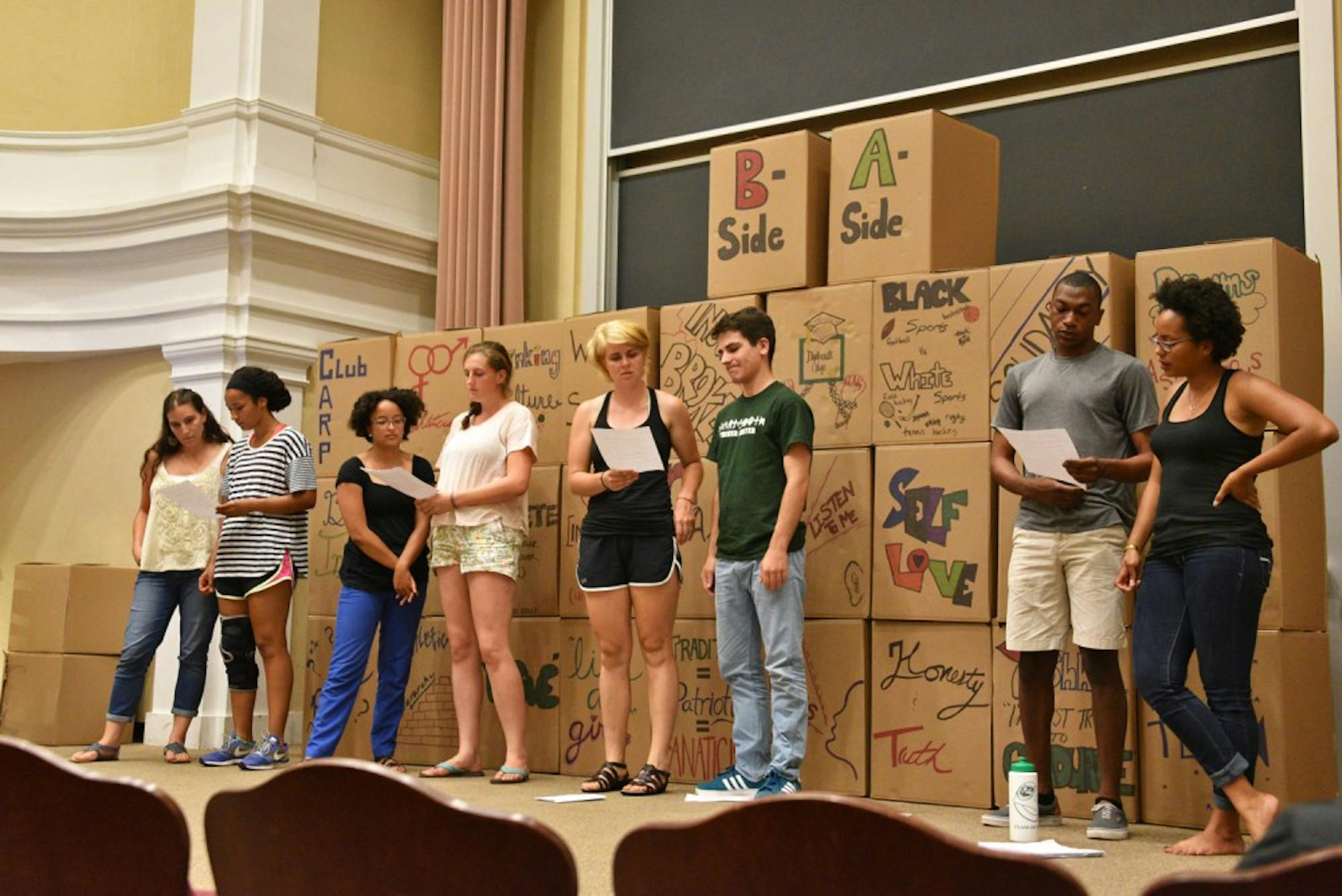A group of students, under the guidance of women’s, gender and sexuality studies professor Pati Hernandez, spoke on the subject of what Hernandez calls Dartmouth’s “invisible walls” on Wednesday night through the program Telling My Story on Campus. The students shared testimonies from across the spectrum focused around one of the College’s most visible and pervasive social divides — those between the hierarchy of Dartmouth athletes, intramural through varsity, and Dartmouth “NARPs,” campus shorthand for non-athletes.
The program, Hernandez said, does not provide answers or any sort of linear solutions to campus problems. Instead, it opens up a dialogue.
“How can we cultivate empathy? How can we understand each other?” Hernandez said. “Instead of labeling because that’s such a superficial way to control and understand the world. You always think to label it because you think, ‘I want to know what it is,’ but you don’t know anything.”
The discussion on stage during the performance, which was held in Dartmouth Hall 105 in front of a modest crowd, touched upon a wide range of issues surrounding athletics.
“What the hell is a black sport?” varsity track and field athlete Jules Hislop ’17 asked the audience from the stage, considering aloud how his race has impacted his athletic experience at Dartmouth.
Casey Cousineau ’17 — one of only two varsity athletes on stage — described the feeling she and the rest of the varsity women’s soccer team feel as fans promptly exit Burnham Field’s stands after the men’s game, not waiting to support the women’s team.
She also touched upon the pressure to have a feminine physique at Dartmouth in a social context, but the difficulty of keeping that image when her body is built to do something completely different — to run miles across the field during a game, to kick a soccer ball all the way up field and to stand its ground when an opposing player comes crashing in shoulder to shoulder.
Simone Schmid ’17, a women’s club volleyball player, spoke of the difficulty of being stripped of her identity at Dartmouth as an athlete after spending most of her life competing as a volleyball player at the state level.
Women’s club water polo player Abby Reynolds ’17 echoed this sentiment saying she receives a different response when she tells people she plays for the club water polo team as opposed to simply Dartmouth’s water polo team.
Dartmouth does not have a men’s or women’s varsity water polo team.
Lexie Lynn ’16, a former rower, spoke of the difficulty of the transition from athlete to NARP after suffering debilitating back injuries, compounded by the unique nature of rowing as a “keep-going-no-matter-what” endurance sport and the “never-let-your-team-down” mentality of a team sport.
The two non-athlete voices on stage joined the program part way through the summer term.
Gabby Bozarth ’17 challenged the importance that sports holds in the minds of students on campus while other issues like racism and systematic oppression dominate her experience at the College.
Terren Klein ’17, who said he feels so far removed from the issue that he doesn’t consider “athlete” or “non-athlete” at all when thinking about his own identity, said the program taught him that athletes’ experience on campus are “incredibly distinct” from non-athletes’ Dartmouth experiences.
“It’s hard to find another activity on campus that demands that much from the students,” Klein said. “Something I drew from that is that it seems unfair how much is required of the individual, and they feel like they sometimes have to make the choice between being a student and an athlete.”
Klein said he takes pride in being a non-athlete because he can distance himself from the stigmas which surround being an athlete, such as being considered unintelligent or uncommitted to academics.
Varsity heavyweight rower Brendan Caldwell ’17, who was in attendance at the event, said the event made him reconsider things about his own experience which he never thought about, such as taking up full tables on the dark side of the Class of 1953 Commons with his team. The students participating in Telling My Story on Campus performed a skit about the exclusive seating in FoCo.
“I guess it was something that I was aware of but I never spent much time thinking about where I should eat in FoCo because I always had a team or someone to sit with,” he said. “The event made clear to me the varied perspectives on the athlete and non-athlete life and how much of a spectrum it is.”
Telling My Story on Campus included responses from write-in surveys from students identifying anywhere on the athletic spectrum. Outside voices expressed dissatisfaction with the lack of respect paid to the club ultimate frisbee team, the lack of acknowledgement given to the club fencing team and dissatisfaction at being allowed into the Floren Varsity House weight room in the dead of winter, in the freezing cold, only at night after the varsity athletes have all gone home.
In the past, Telling My Story on Campus has tackled class divisions, Greek affiliation and unaffiliation, international and domestic students and the tension between students who attend school at Dartmouth and the custodial staff who keep the College running.
Reynolds is a member of the Dartmouth Staff.




